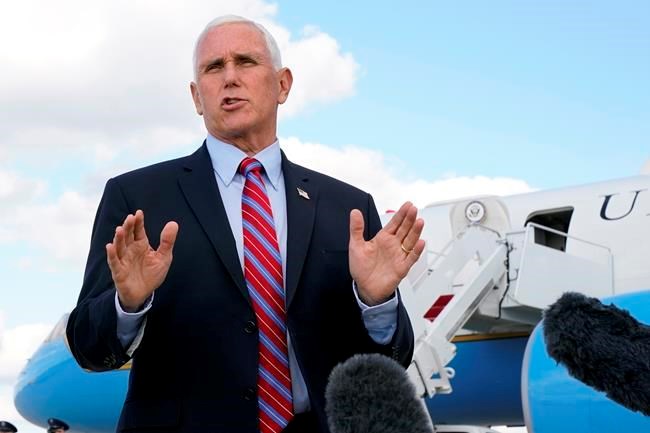WASHINGTON, Wash. — Symptoms of the COVID-19 pandemic, to say nothing of how it has been handled by the White House, will be everywhere Wednesday when Mike Pence and Kamala Harris sit down for their televised vice-presidential debate in Utah.
Members of the studio audience will be wearing face masks, or ejected if they refuse. The vice-president, the senator from California and moderator Susan Page will be nearly four metres apart from each other.
And the Plexiglas barriers dividing the trio will be impossible to ignore.
"That's the lens through which the American people are going to be evaluating these candidates," said Steven D. Cohen, a business communication professor at Johns Hopkins Carey Business School in Baltimore.
"They're literally and figuratively going to be looking at these candidates … through the Plexiglas and asking themselves, 'Who is better prepared to lead this country?'"
This time around, that's not a rhetorical question.
Despite his recent theatrics, President Donald Trump, 74, is sick with COVID-19, a disease that wreaks particular havoc with those in his age group and has killed more than 210,000 Americans.
Former vice-president Joe Biden, meanwhile, looks and sounds every bit the 77-year-old man that he is, a circumstance that has pegged him as a one-term president whose main job for the Democrats is to oust Trump.
Couple that with the fact that voters were able to glean little of substance amid the vitriol of last week's presidential debate, and Wednesday's undercard is looking more and more like the main event.
"At any moment, one of these two vice-presidential contenders could potentially take over as commander-in-chief," Cohen said.
"These two candidates have an opportunity to introduce themselves to the American people, because potentially ⏤ hopefully not in the next four years, but potentially four years from now ⏤ one of them could be a future president."
In many ways, Wednesday's debate will be a polar opposite to last week's insult-riddled confrontation between Biden and Trump.
Harris, a former California attorney general, is expected to deploy her clinical, prosecutorial style against Pence, whose position atop the much-maligned White House coronavirus task force will ensure COVID-19 is a dominant topic.
For his part, the vice-president, whose retiring political style is diametrically opposed to that of his boss, will need to demonstrate there's at least one adult in the White House, said Mitchell McKinney, director of the University of Missouri's Political Communication Institute.
That mission will be helped by the format ⏤ a sit-down, tabletop affair at the University of Utah that McKinney describes as a "chat" debate.
"That debate produces a more reasoned deliberative dialogue; it's a conversation," he said.
"The vice-presidential debate has typically been less attack-oriented, with less bombast, because of that dynamic of how they're seated there."
The pandemic will nonetheless loom large, and not just because of the plastic shields that Pence staffers have mocked the Democrats for demanding.
COVID-19 has been running rampant through the West Wing in the days since Trump himself tested positive last week before spending three chaotic days at Walter Reed National Military Health Center.
That hospital stay, which produced more questions than answers about the president's health, culminated Monday in a theatrical, made-for-TV return to the White House, complete with a breathy, unmasked salute from atop the Truman Balcony.
"Don't let it dominate you," Trump said in a video posted to Twitter minutes later, seemingly oblivious to the mounting death toll or to the number of White House staff who tested positive in his absence.
"Don't be afraid of it."
Trump's efforts to shrug off the crisis continued Tuesday as he pulled the plug on congressional efforts to negotiate a new economic stimulus package, demanding the effort be tabled until after the election and that Republicans on Capitol Hill concentrate instead on confirming his Supreme Court nominee.
As it has been since 2016, it will be Pence's job to portray some method among the madness.
"Pence has to wave it away, deflect from it ⏤ 'Oh, you know, everything's fine. Everything's great,'" McKinney said.
"I think he, particularly, has to deliver that type of reassuring performance, much of it based on what has happened the past few days."
This report by The Canadian Press was first published Oct. 6, 2020.
James McCarten, The Canadian Press

